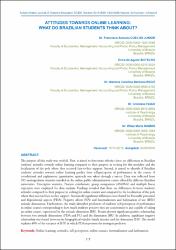| dc.contributor.author | Coelho Junior, Francisco Antonio | |
| dc.contributor.author | Botelho, Erica de Aguiar | |
| dc.contributor.author | Rego, Mariana Carolina Barbosa | |
| dc.contributor.author | Faiad, Cristiane | |
| dc.contributor.author | Ramos, Wilsa Maria | |
| dc.date.accessioned | 2019-11-29T09:07:07Z | |
| dc.date.available | 2019-11-29T09:07:07Z | |
| dc.date.issued | 2019 | en_US |
| dc.identifier.citation | Coelho Junior, F. A., Botelho, E. A., Rego, M.C.B., Faiad, C., Ramos, W.M. (2019). Attitudes towards online learning: what do Brazilian students think about? TOJDE 20 (4), 117-134. | en_US |
| dc.identifier.issn | 1302-6488 | |
| dc.identifier.uri | https://hdl.handle.net/11421/23038 | |
| dc.description.abstract | The purpose of this study was twofold. First, it aimed to determine whether there are differences in Brazilian
students’ attitudes towards online learning compared to their purpose in seeking for this modality and the
localization of the pole where they received face-to-face support. Second, it aimed to identify if Brazilian
students’ attitudes towards online learning predict their self-perception of performance in the course. A
correlational and explanatory quantitative approach was taken through a survey. Data was collected from
593 undergraduate students enrolled in the online public administration course offered by different Brazilian
universities. Descriptive statistics, Pearson correlations, group comparison (ANOVA) and multiple linear
regression were employed for data analysis. Findings revealed that there are differences between students’
attitudes compared to their purpose in seeking for online courses and compared to the localization of the pole
where they received face-to-face support. Statistically significant differences were found for Favorable personnel
and dispositional aspects (PDA), Negative affects (NA) and Internalization and habituation of use (IHU)
attitude dimensions. Furthermore, the study identified predictors of students’ self-perception of performance
in online courses corresponding to how much students perceive they are accustomed to and capable of taking
an online course, represented by the attitude dimension IHU. Results showed significant positive relationship
between two attitude dimensions (PDA and PC) and the dimension IHU. In addition, significant negative
relationship was found between the biographical variable family income and the dimension IHU. The model
explains 40% of the variance of IHU in which PDA represents the strongest predictor. | en_US |
| dc.description.abstract | The purpose of this study was twofold. First, it aimed to determine whether there are differences in Brazilian
students’ attitudes towards online learning compared to their purpose in seeking for this modality and the
localization of the pole where they received face-to-face support. Second, it aimed to identify if Brazilian
students’ attitudes towards online learning predict their self-perception of performance in the course. A
correlational and explanatory quantitative approach was taken through a survey. Data was collected from
593 undergraduate students enrolled in the online public administration course offered by different Brazilian
universities. Descriptive statistics, Pearson correlations, group comparison (ANOVA) and multiple linear
regression were employed for data analysis. Findings revealed that there are differences between students’
attitudes compared to their purpose in seeking for online courses and compared to the localization of the pole
where they received face-to-face support. Statistically significant differences were found for Favorable personnel
and dispositional aspects (PDA), Negative affects (NA) and Internalization and habituation of use (IHU)
attitude dimensions. Furthermore, the study identified predictors of students’ self-perception of performance
in online courses corresponding to how much students perceive they are accustomed to and capable of taking
an online course, represented by the attitude dimension IHU. Results showed significant positive relationship
between two attitude dimensions (PDA and PC) and the dimension IHU. In addition, significant negative
relationship was found between the biographical variable family income and the dimension IHU. The model
explains 40% of the variance of IHU in which PDA represents the strongest predictor. | en_US |
| dc.language.iso | eng | en_US |
| dc.publisher | Anadolu Üniversitesi | en_US |
| dc.relation.isversionof | 10.17718/tojde.640545 | en_US |
| dc.rights | info:eu-repo/semantics/openAccess | en_US |
| dc.rights | Attribution-NonCommercial 3.0 United States | * |
| dc.rights.uri | http://creativecommons.org/licenses/by-nc/3.0/us/ | * |
| dc.subject | Online Learning | en_US |
| dc.subject | Online Learning | en_US |
| dc.subject | Attitudes | en_US |
| dc.subject | Attitudes | en_US |
| dc.subject | Self-perception | en_US |
| dc.subject | Self-perception | en_US |
| dc.subject | Online Courses | en_US |
| dc.subject | Online Courses | en_US |
| dc.subject | Internalization and Habituation | en_US |
| dc.subject | Internalization and Habituation | en_US |
| dc.title | Attitudes towards online learning: what do Brazilian students think about? | en_US |
| dc.type | article | en_US |
| dc.relation.journal | Turkish Online Journal of Distance Education-TOJDE | en_US |
| dc.contributor.department | Anadolu Üniversitesi | en_US |
| dc.contributor.authorID | 0000-0002-1820-5448 | en_US |
| dc.contributor.authorID | 0000-0002-5219-3524 | en_US |
| dc.contributor.authorID | 0000-0002-6939-5130 | en_US |
| dc.contributor.authorID | 0000-0002-8012-8893 | en_US |
| dc.contributor.authorID | 0000-0002-3029-1684 | en_US |
| dc.identifier.volume | 20 | en_US |
| dc.identifier.issue | 4 | en_US |
| dc.identifier.startpage | 117 | en_US |
| dc.identifier.endpage | 134 | en_US |
| dc.relation.publicationcategory | Makale - Uluslararası Hakemli Dergi - Başka Kurum Yazarı | en_US |



















